Is CBD Habit-Forming?
In metro areas, it seems you cannot avoid seeing a store, gas station, or convenience store advertising CBD products. Even in small towns, there are CBD options in retail shops. As the country continues with the progress of accepting cannabis and its recreational and medical functions, there has been an uptick in CBD ads in many places across the United States. So what is CBD? Is it safe? Does it make you high? Can you become addicted to CBD? Throughout this blog, we will examine why CBD has become popular and answer all of the questions above. 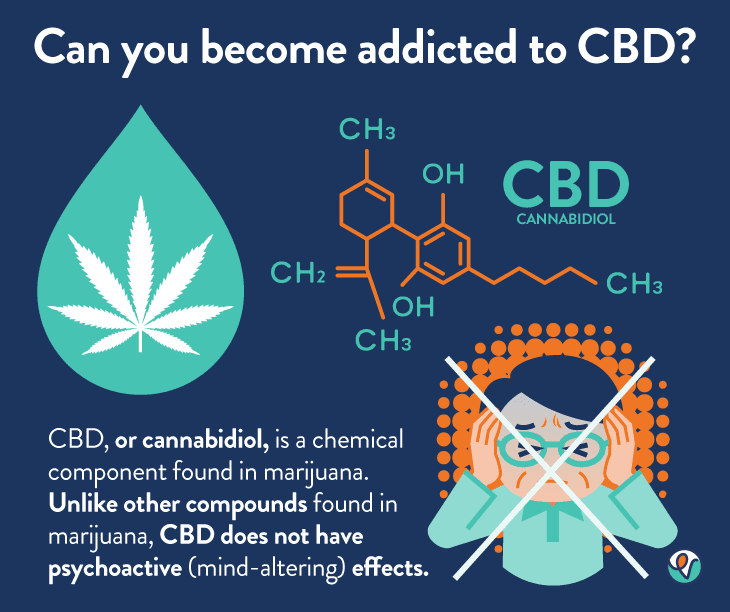
What Is CBD?
CBD, or cannabidiol, is a chemical component found in marijuana. Unlike other compounds found in marijuana, CBD does not have psychoactive (mind-altering) effects. CBD comes from the hemp plant and is the second most prevalent compound found in cannabis. The most prevalent is THC. There are more than 80 chemicals, known as cannabinoids, found in the cannabis plant. Hemp is a form of cannabis plant, as is marijuana, drawing the link between the two. In general, CBD is advertised to help people with pain, anxiety, depression, and insomnia. There are indications CBD may help those with diseases like Parkinson’s disease, Crohn’s disease, and cancer, but more research is needed. There is a prescription CBD product that treats two types of epilepsy. Typically, CBD is consumed sublingually (under the tongue) as an oil. The oil comes in small bottles with droppers to place the oil under the tongue. You may also see CBD come in the form of edibles, a cream that is rubbed into the skin, or liquid that can be used to “vape,” which is short for “vaporize.” Because CBD supplements vary in form, dosage can vary drastically. 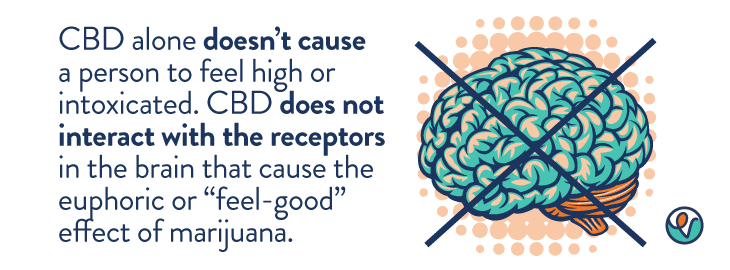
Will CBD Make Me Feel High?
No, CBD alone doesn’t cause a person to feel high or intoxicated. CBD does not interact with the receptors in the brain that cause the euphoric or “feel-good” effect of marijuana. It’s the compound THC that causes the “high” feeling one gets from marijuana use. Some CBD products will contain THC, and with enough of a dosage can cause a minimal intoxicated feeling. Each state varies in how much THC is allowed in CBD products. 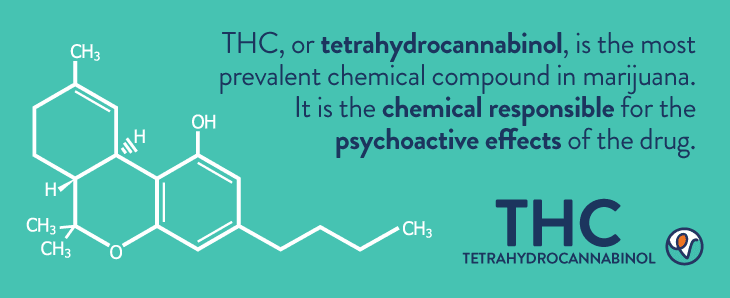
What Is THC, and How Is It Different from CBD?
THC, or tetrahydrocannabinol, is the most prevalent chemical compound in marijuana. It is the chemical responsible for the psychoactive effects of the drug. THC does this by interacting with the body’s natural cannabinoid receptors. When it interacts with the body’s receptors, it causes changes in things like senses, time perception, and more. These changes include a rise in the brain’s release of dopamine, which is best described as the “feel-good” hormone. The effects felt from THC include:
- Elation
- Euphoria (great happiness)
- Relaxation
- Pain relief
- Anxiety
- Sedation
- Nausea and vomiting
- Dry mouth
Effects of CBD
So if CBD doesn’t make you feel high, what does it do? Are there potential negative effects? There are many side effects that closely relate to the effects of THC, but often do not occur to the same degree. At times, CBD can cause drowsiness or sedation. More often than not, drowsiness or sedation from CBD use is caused by combining other substances along with CBD. Similar to THC, CBD can also cause dry mouth. Often referred to as “cotton mouth,” CBD can cause your eyes and/or mouth to dry out. Another effect that THC and CBD have in common is nausea — especially when it is the first time someone is trying CBD or THC, nausea and/or vomiting are possible. This is mostly true when someone takes too much of either substance. Gastrointestinal issues can occur as a result of consuming CBD. Some cases of diarrhea or stomach pain have been reported from CBD use. While CBD can have negative side effects, there is some research to suggest that the consistent consumption of CBD can help with numerous ailments, and some people swear by it. Side effects from CBD can vary greatly as there are multiple ways of consuming it. A person using CBD oil and CBD vapor may experience two completely different things even though the substances are technically the same. The same is true for two different people both taking what seems to be the same amount of a CBD edible. Effects will vary. It is important that you consult a doctor before beginning any form of CBD use as the side effects that can be felt may depend on your medical history and/or current prescriptions.
Is CBD Addictive?
Because CBD doesn’t produce a high feeling, medical researchers believe there to be little chance for a person to become addicted to it or to misuse it. A 2018 study of the misuse potential of CBD among those who engage in polydrug use (taking multiple different drugs) concluded that “(the) administration of a therapeutic dose of CBD (750 mg) showed significantly low use potential in a highly sensitive population of polydrug users.” Among the test subjects who received doses of a high amount of CBD (1500 mg and 4500 mg), there were small detectable effects, but the effects were much weaker than those seen from many other drugs, specifically alprazolam (Xanax) and dronabinol (Marinol) in this study. 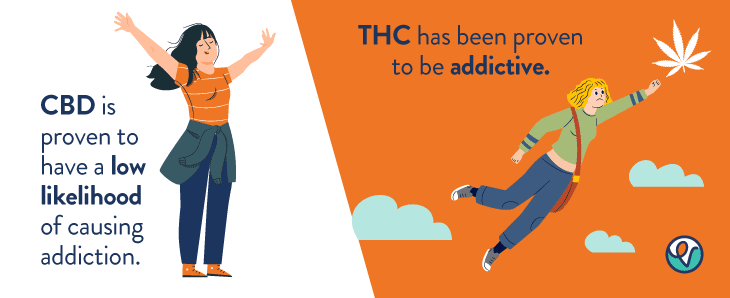 While CBD is proved to have a low likelihood of causing addiction, THC has been proved to be addictive. Because of the psychoactive effects of THC, there is discerning evidence of misuse potential. According to the Centers for Disease Control and Prevention (CDC), addiction happens to 10% of those who engage in marijuana use because of the presence of THC. Why are we talking about THC in a section about CBD addiction? Because many CBD products contain THC. A 2020 report released by the Food and Drug Administration (FDA) found that THC was detectable in more than half of all CBD products tested. While most CBD products contain a small amount of THC, you still leave the opportunity open, with a consistent and high-enough dosage, to consume enough THC to begin feeling the effects. The key in finding CBD with no THC is making sure the product is derived directly from the hemp plant. This will take time, research, and a clear understanding and trust of where you are purchasing the product. If you live in a state in which cannabis is still illegal, CBD can contain no more than 0.3% THC. This amount would not be enough to feel the effects.
While CBD is proved to have a low likelihood of causing addiction, THC has been proved to be addictive. Because of the psychoactive effects of THC, there is discerning evidence of misuse potential. According to the Centers for Disease Control and Prevention (CDC), addiction happens to 10% of those who engage in marijuana use because of the presence of THC. Why are we talking about THC in a section about CBD addiction? Because many CBD products contain THC. A 2020 report released by the Food and Drug Administration (FDA) found that THC was detectable in more than half of all CBD products tested. While most CBD products contain a small amount of THC, you still leave the opportunity open, with a consistent and high-enough dosage, to consume enough THC to begin feeling the effects. The key in finding CBD with no THC is making sure the product is derived directly from the hemp plant. This will take time, research, and a clear understanding and trust of where you are purchasing the product. If you live in a state in which cannabis is still illegal, CBD can contain no more than 0.3% THC. This amount would not be enough to feel the effects.
Is CBD Legal?
Cannabis laws differ by state. As of this writing, there are 19 states and territories in the United States that have legalized recreational marijuana. They are (in alphabetical order):
- Alaska
- Arizona
- California
- Colorado
- Connecticut
- Illinois
- Maine
- Massachusetts
- Michigan
- Montana
- Nevada
- New Jersey
- New Mexico
- New York
- Oregon
- South Dakota
- Vermont
- Virginia
- Washington
In each of these states, CBD is fully legal. In fact, even in states with no legalization of marijuana, most have legalized CBD products made from hemp. There are just two states where CBD is still illegal. They are Iowa and Idaho. Local jurisdictions may have further restrictions that you should check out before purchasing or carrying CBD on your person.
Will I Fail a Drug Test From Consuming CBD?
Theoretically, people can fail a drug test if they consume a CBD product that also contains THC. Even in CBD products that claim to have no THC, there may be THC present. As CBD production and sales continue to grow rapidly, and testing and legislation is still catching up, not all CBD products from all manufacturers are third-party tested. This leads to some manufacturers having misrepresented labels with false claims on them in order to make sales. If you are subject to drug testing for cannabis and other substances, but still have interest in consuming CBD for the potential benefits, there are opportunities for you to ensure your safety. While you may have trouble determining the quality of a CBD product, you can look to your state’s specific laws to see how in-depth their testing of products is. In states that have legalized marijuana, both recreational and medical, standards are often higher when it comes to all hemp and cannabis products — including CBD oil products. If you want to avoid digging into your state’s codes, take a specific CBD oil company that you have found and look directly at their process. When a manufacturer goes through the process of testing their products and guaranteeing the quality of their products, they will advertise it loud and proud on their social media, website, and paid advertising. It will be easy to find a CBD company that does their due diligence. If you speak with someone from a company that provides CBD and you’re interested in being as safe as possible, you can ask for proof of a certificate of analysis. This certificate will provide any results the product has for testing. If this is refused when requested, you’ve likely found a place that isn’t confident in their product. CBD is still an unregulated industry. Jumping right into buying a product and consuming it without research can leave you in danger of consuming THC or cannabis without knowledge. This could lead to a failed drug test of your urine, blood, or saliva.
Should I Avoid CBD If I Am Recovering from Marijuana Addiction?
Marijuana addiction is real, and if you’re reading this as someone who is in recovery from marijuana addiction, you may be interested in learning if CBD is safe for you. Everyone is different, so if you’re interested in CBD, simply ask your doctor or treatment center what they think of the idea for you. If you’re reading this and are not sure if you have a marijuana addiction, there are options to learn more about treatment for marijuana addiction and the disorder you may be facing. 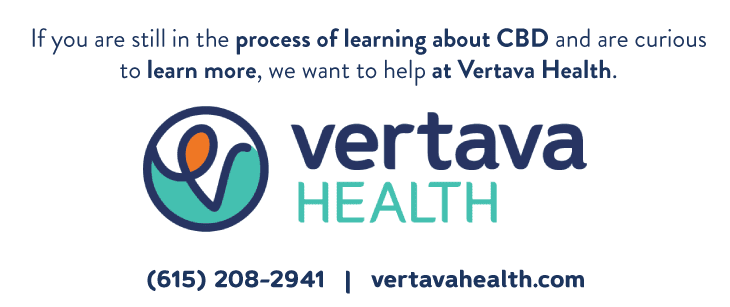
Learn More About CBD with Vertava Health
If you are still in the process of learning about CBD and are curious to learn more, we want to help at Vertava Health. New information comes out daily about CBD and the positive and negative effects it may have on people. We don’t expect you to keep up with the constant flow of information. We take the time to talk about the important things that matter to you and your loved ones. If you want to learn more, call us today to chat at 844-470-0410, or continue reading more about CBD here.
FAQs:
How addictive is CBD oil?
Research is still young on the topic of the addictive properties of CBD. However, many early studies have shown there is a low chance for misuse, perhaps tied to the fact that CBD does not have psychoactive effects on the human mind. As opposed to THC, which can be habit-forming, at this time CBD is not known as an addictive substance.
How long does a CBD high last?
CBD does not make you high. There are no psychoactive effects from CBD. However, certain CBD products can contain enough THC to cause someone to feel a slight euphoria. The more THC compound that exists in the CBD dose, the more likely it is that a high will be obtained.
Does CBD really do anything?
CBD, or cannabinol, is the second most prevalent ingredient in cannabis (marijuana). While it is a component of cannabis, it is actually derived from the hemp plant. CBD, while it does not cause a “high,” is said to cause a number of things in those who use it. For those looking for the relaxing and calming effects of marijuana without the illegality or psychoactive effects from it, CBD may offer a loophole. CBD is promoted to help reduce stress/anxiety, depression, and post-traumatic stress disorder (PTSD). It has also been advertised to help induce sleep in those who struggle with insomnia. The true effects vary from person to person.


